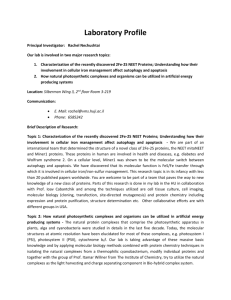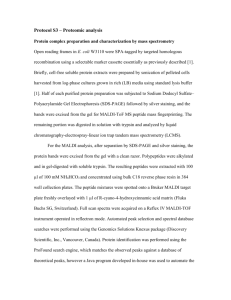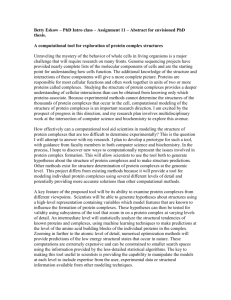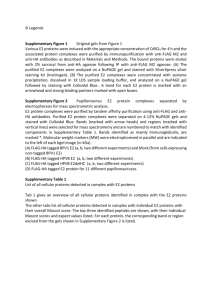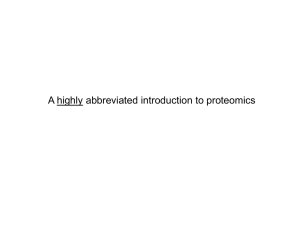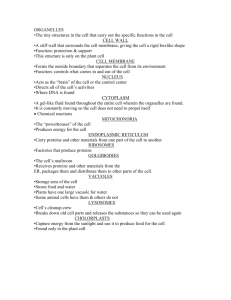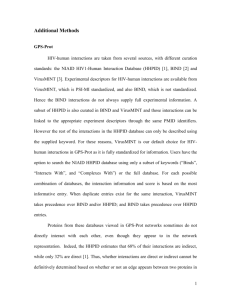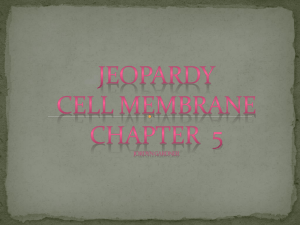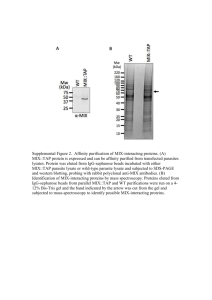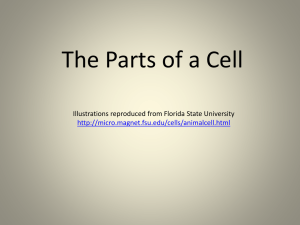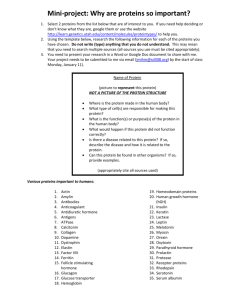2012rnaSuplData2
advertisement
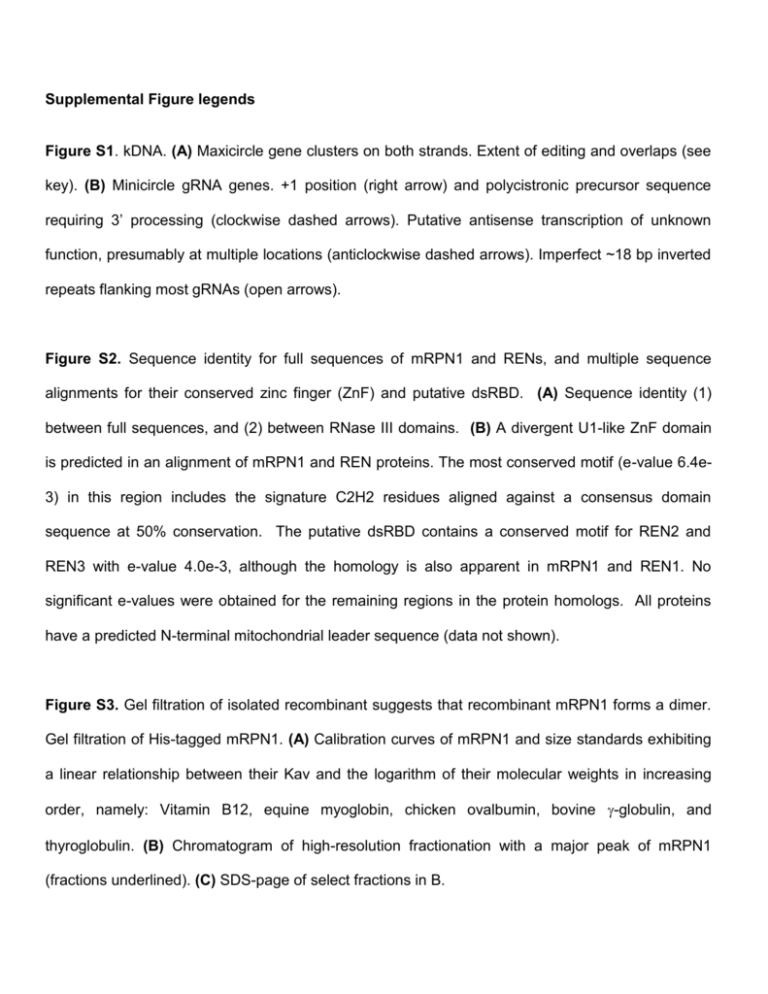
Supplemental Figure legends Figure S1. kDNA. (A) Maxicircle gene clusters on both strands. Extent of editing and overlaps (see key). (B) Minicircle gRNA genes. +1 position (right arrow) and polycistronic precursor sequence requiring 3’ processing (clockwise dashed arrows). Putative antisense transcription of unknown function, presumably at multiple locations (anticlockwise dashed arrows). Imperfect ~18 bp inverted repeats flanking most gRNAs (open arrows). Figure S2. Sequence identity for full sequences of mRPN1 and RENs, and multiple sequence alignments for their conserved zinc finger (ZnF) and putative dsRBD. (A) Sequence identity (1) between full sequences, and (2) between RNase III domains. (B) A divergent U1-like ZnF domain is predicted in an alignment of mRPN1 and REN proteins. The most conserved motif (e-value 6.4e3) in this region includes the signature C2H2 residues aligned against a consensus domain sequence at 50% conservation. The putative dsRBD contains a conserved motif for REN2 and REN3 with e-value 4.0e-3, although the homology is also apparent in mRPN1 and REN1. No significant e-values were obtained for the remaining regions in the protein homologs. All proteins have a predicted N-terminal mitochondrial leader sequence (data not shown). Figure S3. Gel filtration of isolated recombinant suggests that recombinant mRPN1 forms a dimer. Gel filtration of His-tagged mRPN1. (A) Calibration curves of mRPN1 and size standards exhibiting a linear relationship between their Kav and the logarithm of their molecular weights in increasing order, namely: Vitamin B12, equine myoglobin, chicken ovalbumin, bovine -globulin, and thyroglobulin. (B) Chromatogram of high-resolution fractionation with a major peak of mRPN1 (fractions underlined). (C) SDS-page of select fractions in B. Figure S4. REH2 downregulation does not affect the level of pre-gRNA transcripts. qPCR of REH2, edited and unedited mRNAs as in Fig. 5, and pre-gRNA fragments as in Fig. 7 (in a dashed box). The assays were standardized as in Fig. 5. Figure S5. mRPN1 interaction with TbRGG2 in a yeast two-hybrid analysis. (A) Cartoon of array of protein pairs assayed in the screen. The plate labeling indicates fusion with activation domain (AD) over fusion with binding domain (BD). All interactions were tested in both directions. Haploid yeast strains of all pair-wise combinations were grown on medium lacking Trp, Leu and His. (B) Plates were supplemented with 1 or 5 mM 3-AT as indicated. All background growth was eliminated at 1 mM 3-AT. The assayed proteins except for mRPN1 are components of compositionally overlapping MRB-related complexes. RGG2, 4160, 8170, 1820, 8180 and 8620 are abbreviations, respectively, for: TbRGG2, Tb927.4.4160, Tb927.8.8170, Tb927.3.1820, Tb927.8.8180, Tb11.02.8620, GAP1 (also known as GRBC2). The mRPN1-BD and TbRGG2-AD fusions displayed a positive interaction. The interaction was only observed in one direction, implying that one or both fusions in the alternative configuration interfere with the interaction. This may also explain the absence of binding of mRPN1 with itself in this analysis. (C) Handover model of gRNA from mRPN1 complexes to MRB complexes, and to editing complexes. Table S1. Nuclease-resistant mRPN1-associated proteins. Mass spectrometric analyses of TAP purifications from ~20-30 S mitochondrial fractions no. 6-to-9, as in Fig. 8. The number of unique peptides (i.e., found two times as a minimum) both before and after an extensive nuclease treatment with nucleases (NUase): RNases A, T1,V1 and micrococcal nuclease, while proteins were bound to the beads. mRPN1 is novel but the associated proteins shown in this table were detected (+) or not (n.d.) in the compositionally overlapping MRB-related complexes, namely: immunopurified (IP) REH2 and MRB1 complexes, and TAP-purified TbRGG1 or GRBC1/2 complexes (Hashimi et al., 2008; Panigrahi et al., 2008; Weng et al., 2008; Hernandez et al., 2010). GRBC1/2 (+) indicates proteins found in both GRBC1 and GRBC2 purifications, whereas (+/-) indicates found only in the former.
